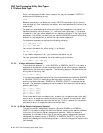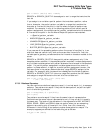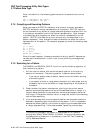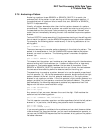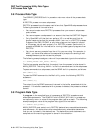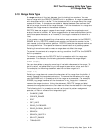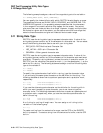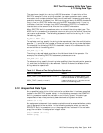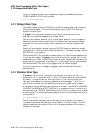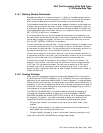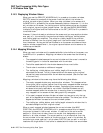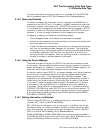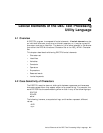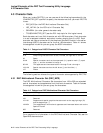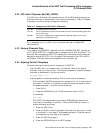DEC Text Processing Utility Data Types
3.12 Unspecified Data Type
To give a variable the data type unspecified, assign the predefined constant
TPU$K_UNSPECIFIED to the variable:
prog := TPU$K_UNSPECIFIED;
3.13 Widget Data Type
The DECwindows version of DECTPU provides the widget data type to support
DECwindows widgets. The non-DECwindows version of DECTPU does not
support this data type.
A widget is an interaction mechanism by which users give input to an
application or receive messages from an application.
You can use the equal operator (=) or the not-equal operator (<>) on widgets to
determine whether they are equal (that is, whether they are the same widget
instance), but you cannot use any other relational or arithmetic operators on
them.
Once you have created a widget instance, DECTPU does not delete the widget
instance, even if there are no variables referencing it. To delete a widget, use the
DELETE built-in procedure.
DECwindows DECTPU provides the same support for DECwindows gadgets that
it provides for widgets. A gadget is a structure similar to a widget, but it is not
associated with its own unique DECwindows window. Gadgets do not require as
much memory to implement as widgets do. In most cases, you can use the same
DECwindows DECTPU built-ins on gadgets that you use on widgets.
For more information on widgets or gadgets, see the OpenVMS overview
documentation.
3.14 Window Data Type
A window is a portion of the screen that displays as much of the text in a
buffer as will fit in the screen area. In EVE, the screen contains three windows
by default: a large window for viewing the text in your editing buffer and
two one-line windows for displaying commands and messages. In EVE or in a
user-written interface, you can subdivide the screen to create more windows.
A variable of the window data type ‘‘contains’’ a window. The CREATE_WINDOW,
CURRENT_WINDOW, and GET_INFO built-in procedures return a value of the
window data type. CREATE_WINDOW is the only built-in procedure that creates
a new window. The following example assigns a value of the window data type to
the variable x:
x := CREATE_WINDOW (1, 12, OFF);
The first parameter specifies that the window starts at screen line number 1.
The second parameter specifies that the window is 12 lines in length. The OFF
keyword specifies that a status line is not to be displayed when the window is
mapped to the screen.
3–22 DEC Text Processing Utility Data Types



